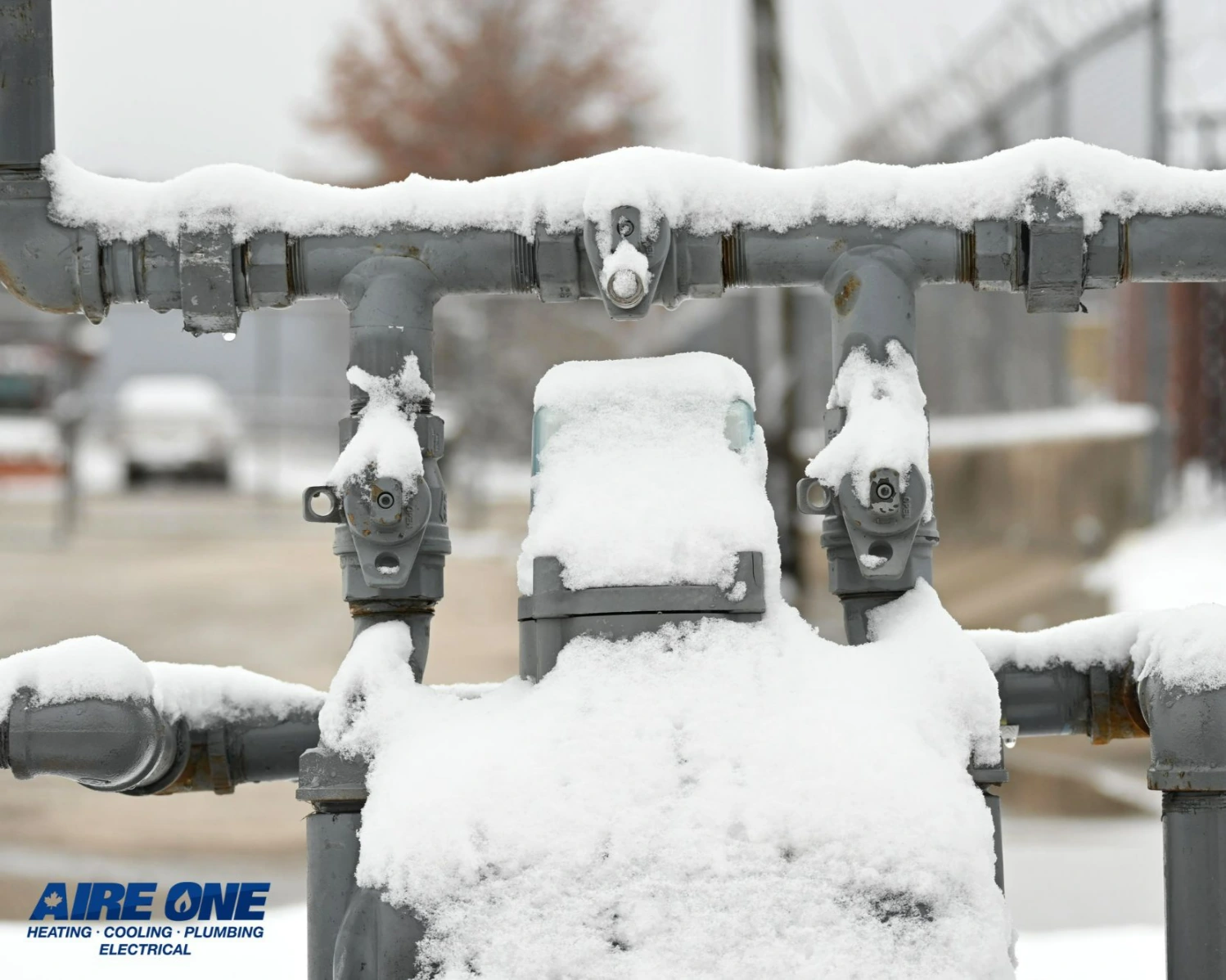Ontario winters are long and cold. When the temperature drops, frozen pipes become a real threat. A frozen pipe can burst and flood your home. Repairs cost thousands of dollars, and the mess takes weeks to fix. The good news? With a solid plumbing checklist and some simple steps, you can protect pipes winter after winter, and we are here to help you with this!
Why Are Frozen Pipes a Problem?
Frozen pipes stop water from flowing. When water freezes, it expands. That pressure builds inside the pipe until it bursts. Burst pipes damage walls, floors, and furniture. Insurance may cover some of it, but you still deal with stress and cleanup. Avoid frozen pipes by having regular plumbing maintenance before the deep freeze sets in.
Frozen pipes are not just a risk in old houses. Even new builds can freeze if the plumbing is not set up right. Pipes in exterior walls or unheated spaces are always at risk. Once frozen, you lose water service until they thaw, and sometimes they don’t survive the process.

Key Plumbing Freeze Tips for Ontario Homes
Now, let’s check out some important plumbing tips winter homeowners should follow:
Keep the heat steady
Don’t lower the thermostat too much at night. A small energy saving isn’t worth the cost of burst pipes.
Watch shut-off valves
Learn where your main shut-off is. If pipes burst, quick action can limit water damage.
Open cabinet doors
Let warm air reach pipes under sinks in kitchens and bathrooms.
Drip faucets
A slow trickle keeps water moving, which makes it harder for pipes to freeze.
Seal drafts
Cold air near pipes makes freezing faster. Seal cracks in walls and around windows.
Add insulation
Foam sleeves or pipe wrap keep heat in and cold out.
How to Winterize Plumbing Step by Step
To winterize plumbing, follow this plumbing checklist:
- Drain outdoor faucets and garden hoses. Store hoses indoors.
- Shut off water to outdoor spigots and use covers.
- Insulate pipes in crawl spaces, garages, and basements.
- Check for leaks and fix them before the cold sets in.
- Flush your water heater to clear out sediment. This keeps it efficient all winter.
- Have an HVAC contractor check your furnace to ensure steady heat.
- Install heat tape on problem pipes if needed.
These steps prevent pipe freeze and reduce energy waste. Every step matters because Ontario winters are harsh and unpredictable.
Plumbing Maintenance and Long-Term Protection
Regular plumbing maintenance lowers the risk of frozen pipes. Schedule yearly checks with a licensed plumber or HVAC company. Professionals can spot weak spots and recommend upgrades. For example, rerouting exposed pipes or adding heating cables in problem areas. HVAC services often include plumbing freeze tips during winter tune-ups, so you get full protection for your home systems.
Don’t skip routine checks. Small leaks become worse in winter. A dripping pipe can freeze faster than a dry one. Having a professional check before the first deep freeze is one of the smartest investments you can make.

When to Call an HVAC Contractor?
DIY steps go a long way, but some jobs need pros. Call an HVAC contractor if:
- Your home has pipes in unheated areas that keep freezing.
- You notice reduced water flow, which may mean a frozen section.
- You need to install pipe insulation in hard-to-reach spots.
- You want a full plumbing and heating check before winter.
- You want advice on energy savings while keeping pipes safe.
An HVAC company can combine plumbing maintenance with furnace and heating checks. This makes sure your whole home stays safe during winter. Hiring one contractor for both plumbing and HVAC services often saves time and money.
Costs of Ignoring Plumbing Freeze Tips
Skipping plumbing maintenance can be very expensive. Here’s what happens if you avoid frozen pipes prevention:
Repair bills
Fixing burst pipes often costs $2,000–$10,000.
Water damage
Drywall, floors, and furniture need replacement.
Mold growth
Moisture from plumbing leaks creates health risks and mold growth.
Insurance limits
Some insurance companies may not cover the full costs if you didn’t take steps to prevent a pipe freeze.
Protect pipes winter after winter with simple steps and professional help. Prevention is always cheaper than repairs.
Special Notes for Ontario Winters
Ontario winters are harsh. Temperatures often dip below -20°C. Homes in Kitchener-Waterloo, Guelph, Cambridge, and across the province face the same risks. Here’s what to keep in mind:
- Basement and garage pipes freeze first. Focus on those.
- Long cold snaps mean your plumbing checklist is not optional. It’s essential.
- Outdoor pipes need to be shut off and drained every fall.
- Travel plans matter. If you leave home for winter, keep the heat on low but steady and have someone check your home if possible.
- Adding pipe insulation and keeping your HVAC system strong are the best ways to avoid frozen pipes in our climate.

Final Plumbing Checklist Before Winter
Use this quick list to protect your pipes:
- Drain and shut off outdoor water lines.
- Cover outdoor faucets.
- Insulate exposed pipes.
- Seal drafts around pipes.
- Keep the home heated, even when away.
- Open cabinets under sinks.
- Drip faucets during deep freezes.
Contact Aire One for your plumbing checks!
This plumbing checklist keeps you safe from burst pipes and costly damage, but if you’re still worried about frozen pipes, call our HVAC company today!
Don’t wait until a pipe bursts. Take action now. Our licensed HVAC contractors handle plumbing maintenance and heating checks to keep your home safe. We offer plumbing freeze tips, pipe protection, and full HVAC services for Ontario homes. Call us now and we will provide you with a free quote and do everything we can to keep you warm, dry, and stress-free this winter.

